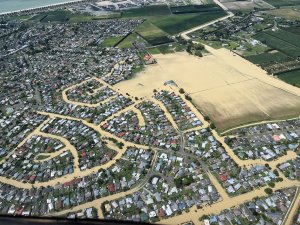Respiratory physician Lutz Beckert considers chronic obstructive pulmonary disease management, including the prevention of COPD, the importance of smoking cessation and pulmonary rehabilitation, and the lifesaving potential of addressing treatable traits. He also discusses the logic of inhaler therapy, moving from single therapy to dual and triple therapy when indicated, as well as other aspects of management
Managing in an era of extremes: Tairāwhiti’s cyclone experience shows way of the future
Managing in an era of extremes: Tairāwhiti’s cyclone experience shows way of the future

"Roads are still falling away and we don’t know when they are going to get fixed"
Adapting to the ongoing impact of climate change is the new reality for primary care in remote regions such as Tairāwhiti, says Michelle Te Kira.
The impacts of Cyclone Hale and Cyclone Gabrielle this year have highlighted the need for general practices to be aware of climate change and how it can affect day-to-day operations, says Ms Te Kira, general manager of Gisborne’s Three Rivers Medical.
“We definitely learned some valuable lessons,” she says.
The Tairāwhiti region was hit hard by Cyclone Hale in January and is still dealing with the aftermath of Cyclone Gabrielle, which had a devastating impact a month later.

The ex-tropical cyclone first made landfall in Northland on 12 February and ripped through the upper and eastern North Island, bringing high winds and flooding and damaging hundreds of properties.
Gisborne’s water supply was seriously affected and local residents were sent emergency messages telling them to conserve water.
The roading network was also damaged by landslides and flooding.
Towns along State Highway 35 were cut off after the Hikuwai Bridge was destroyed and the road between Tolaga Bay and Te Puia Springs suffered serious damage.
Ms Te Kira says trying to run a primary practice during such mayhem was a struggle.
“There was no power, no telecommunications, no EFTPOS and we had no cashflow,” she says.
“It was a real nightmare.”
READ MORE
- NEWS: Torrential rain closes practice: After contamination incident, Gisborne clinic braces for bad weather
- OPINION: We are burning up and drowning: Plan, act, do: Health’s job in the climate change emergency
- NEWS: In the thick of a changing climate - Locum sees vulnerability of rural health services
The practice team soldiered on and kept the doors open seven days a week.
A skeleton staff of two doctors and two nurses was on duty at any one time and agreed to take patients from two other practices that had been forced to close.
“Anyone who walked in was treated and we weren’t going to ask them to pay,” says Ms Te Kira, who is also chair of the Practice Managers and Administrators Association of New Zealand.
Without internet, Three Rivers Medical went back to processing everything on paper, she says.
Some staff couldn’t get to work as they were cut off, so those who could be at work had to go the extra mile.
“We even had to arrange getting medication to one patient via 4WD.”
Specialist GP Liza Fairbairn from Gisborne’s De Lautour Medical says closure of schools and daycare centres only added to the pressures.
“We couldn’t get out and we had to rely on the navy to bring in food supplies,” says Dr Fairbairn.
On 15 February weather warnings were lifted and local residents began the clean-up.
Ms Te Kira says Three Rivers Medical has since developed a plan for next time the region is hit by an extreme weather event.
That includes some cash to cover day-to-day operations and diesel for generators, and the practice also invested in a 4WD vehicle.
All the region’s practices now have an agreement with Civil Defence and Te Whatu Ora on how to respond in future, Ms Te Kira says.
Three Rivers Medical specialist GP and Te Whatu Ora general practice liaison, Sarah Callaghan says the worst effects of the cyclone have long gone but its after-effects are still being felt in Gisborne.
Land slips and damage to infrastructure including roads and stormwater systems are an ongoing problem for businesses.
“It has had long-term effects for the community,” Dr Callaghan says. “The whole area is still wrecked. Roads are still falling away and we don’t know when they are going to get fixed.”
Ms Te Kira says some communities remain cut off, with access only by boat.
Every time there’s a downpour, people are anxious. She describes it as climate fatigue: “Every time it rains, you think, is this it?”
We're publishing this article as a FREE READ so it is FREE to read and EASY to share more widely. Please support us and our journalism – subscribe here
One of the benefits of subscribing is you will also be able to share your thoughts about what you read with other in our Comment Stream. You can also take notes on what you read with Capture









![Barbara Fountain, editor of New Zealand Doctor Rata Aotearoa, and Paul Hutchison, GP and senior medical clinician at Tāmaki Health [Image: Simon Maude]](/sites/default/files/styles/thumbnail_cropped_100/public/2025-03/Barbara%20Fountain%2C%20editor%20of%20New%20Zealand%20Doctor%20Rata%20Aotearoa%2C%20and%20Paul%20Hutchison%2C%20GP%20and%20senior%20medical%20clinician%20at%20T%C4%81maki%20Health%20CR%20Simon%20Maude.jpg?itok=-HbQ1EYA)
![Lori Peters, NP and advanced health improvement practitioner at Mahitahi Hauora, and Jasper Nacilla, NP at The Terrace Medical Centre in Wellington [Image: Simon Maude]](/sites/default/files/styles/thumbnail_cropped_100/public/2025-03/2.%20Lori%20Peters%2C%20NP%20and%20advanced%20HIP%20at%20Mahitahi%20Hauora%2C%20and%20Jasper%20Nacilla%2C%20NP%20at%20The%20Terrace%20Medical%20Centre%20in%20Wellington%20CR%20Simon%20Maude.jpg?itok=sUfbsSF1)
![Ministry of Social Development health and disability coordinator Liz Williams, regional health advisors Mary Mojel and Larah Takarangi, and health and disability coordinators Rebecca Staunton and Myint Than Htut [Image: Simon Maude]](/sites/default/files/styles/thumbnail_cropped_100/public/2025-03/3.%20Ministry%20of%20Social%20Development%27s%20Liz%20Williams%2C%20Mary%20Mojel%2C%20Larah%20Takarangi%2C%20Rebecca%20Staunton%20and%20Myint%20Than%20Htut%20CR%20Simon%20Maude.jpg?itok=9ceOujzC)
![Locum GP Helen Fisher, with Te Kuiti Medical Centre NP Bridget Woodney [Image: Simon Maude]](/sites/default/files/styles/thumbnail_cropped_100/public/2025-03/4.%20Locum%20GP%20Helen%20Fisher%2C%20with%20Te%20Kuiti%20Medical%20Centre%20NP%20Bridget%20Woodney%20CR%20Simon%20Maude.jpg?itok=TJeODetm)
![Ruby Faulkner, GPEP2, with David Small, GPEP3 from The Doctors Greenmeadows in Napier [Image: Simon Maude]](/sites/default/files/styles/thumbnail_cropped_100/public/2025-03/5.%20Ruby%20Faulkner%2C%20GPEP2%2C%20with%20David%20Small%2C%20GPEP3%20from%20The%20Doctors%20Greenmeadows%20in%20Napier%20CR%20Simon%20Maude.jpg?itok=B0u4wsIs)
![Rochelle Langton and Libby Thomas, marketing advisors at the Medical Protection Society [Image: Simon Maude]](/sites/default/files/styles/thumbnail_cropped_100/public/2025-03/6.%20Rochelle%20Langton%20and%20Libby%20Thomas%2C%20marketing%20advisors%20at%20the%20Medical%20Protection%20Society%20CR%20Simon%20Maude.jpg?itok=r52_Cf74)
![Specialist GP Lucy Gibberd, medical advisor at MPS, and Zara Bolam, urgent-care specialist at The Nest Health Centre in Inglewood [Image: Simon Maude]](/sites/default/files/styles/thumbnail_cropped_100/public/2025-03/7.%20Specialist%20GP%20Lucy%20Gibberd%2C%20medical%20advisor%20at%20MPS%2C%20and%20Zara%20Bolam%2C%20urgent-care%20specialist%20at%20The%20Nest%20Health%20Centre%20in%20Inglewood%20CR%20Simon%20Maude.jpg?itok=z8eVoBU3)
![Olivia Blackmore and Trudee Sharp, NPs at Gore Health Centre, and Gaylene Hastie, NP at Queenstown Medical Centre [Image: Simon Maude]](/sites/default/files/styles/thumbnail_cropped_100/public/2025-03/8.%20Olivia%20Blackmore%20and%20Trudee%20Sharp%2C%20NPs%20at%20Gore%20Health%20Centre%2C%20and%20Gaylene%20Hastie%2C%20NP%20at%20Queenstown%20Medical%20Centre%20CR%20Simon%20Maude.jpg?itok=Z6u9d0XH)
![Mary Toloa, specialist GP at Porirua and Union Community Health Service in Wellington, Mara Coler, clinical pharmacist at Tū Ora Compass Health, and Bhavna Mistry, specialist GP at Porirua and Union Community Health Service [Image: Simon Maude]](/sites/default/files/styles/thumbnail_cropped_100/public/2025-03/9.%20Mary%20Toloa%2C%20Porirua%20and%20Union%20Community%20Health%20Service%20in%20Wellington%2C%20Mara%20Coler%2C%20T%C5%AB%20Ora%20Compass%20Health%2C%20and%20Bhavna%20Mistry%2C%20PUCHS%20CR%20Simon%20Maude.jpg?itok=kpChr0cc)